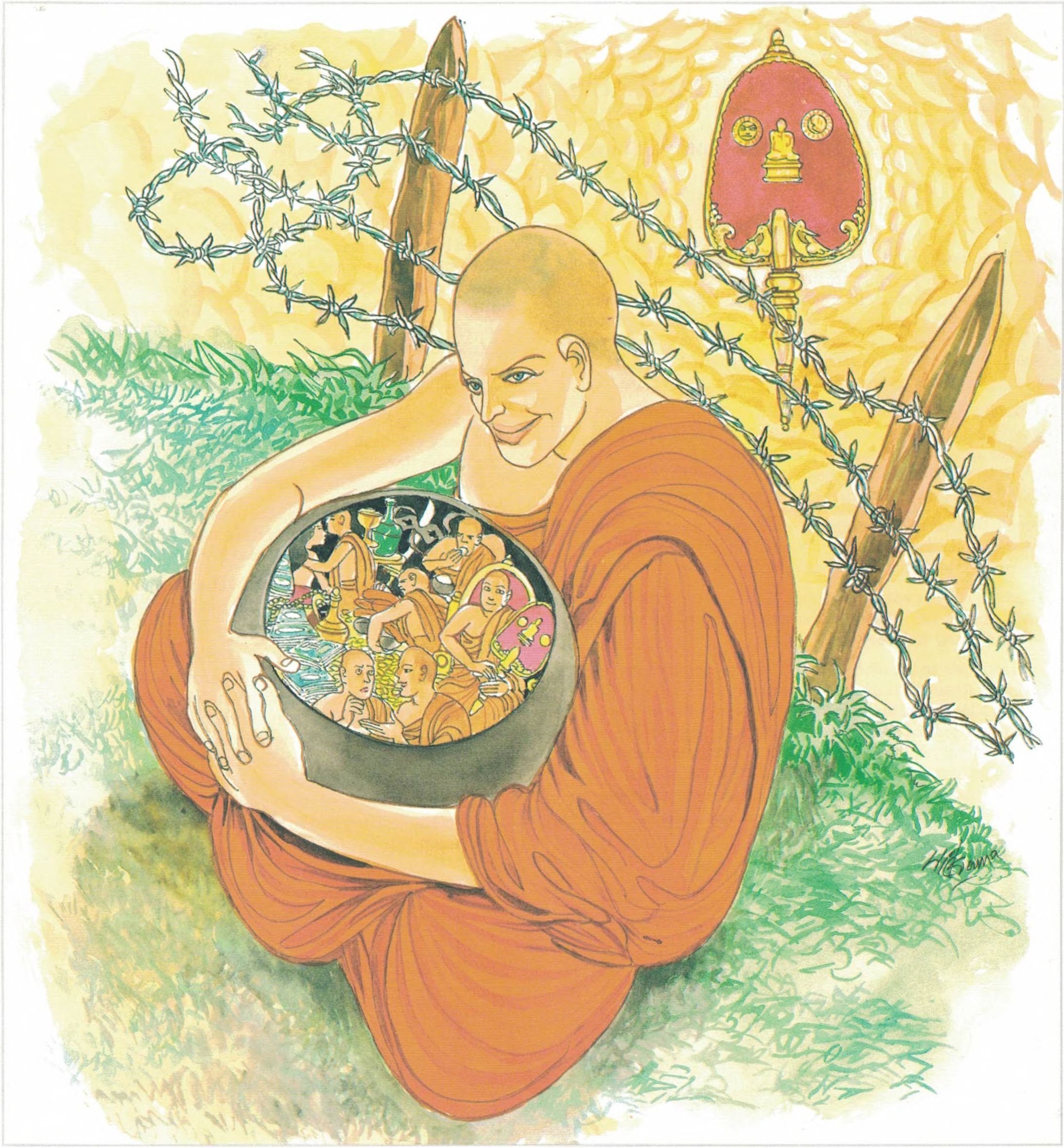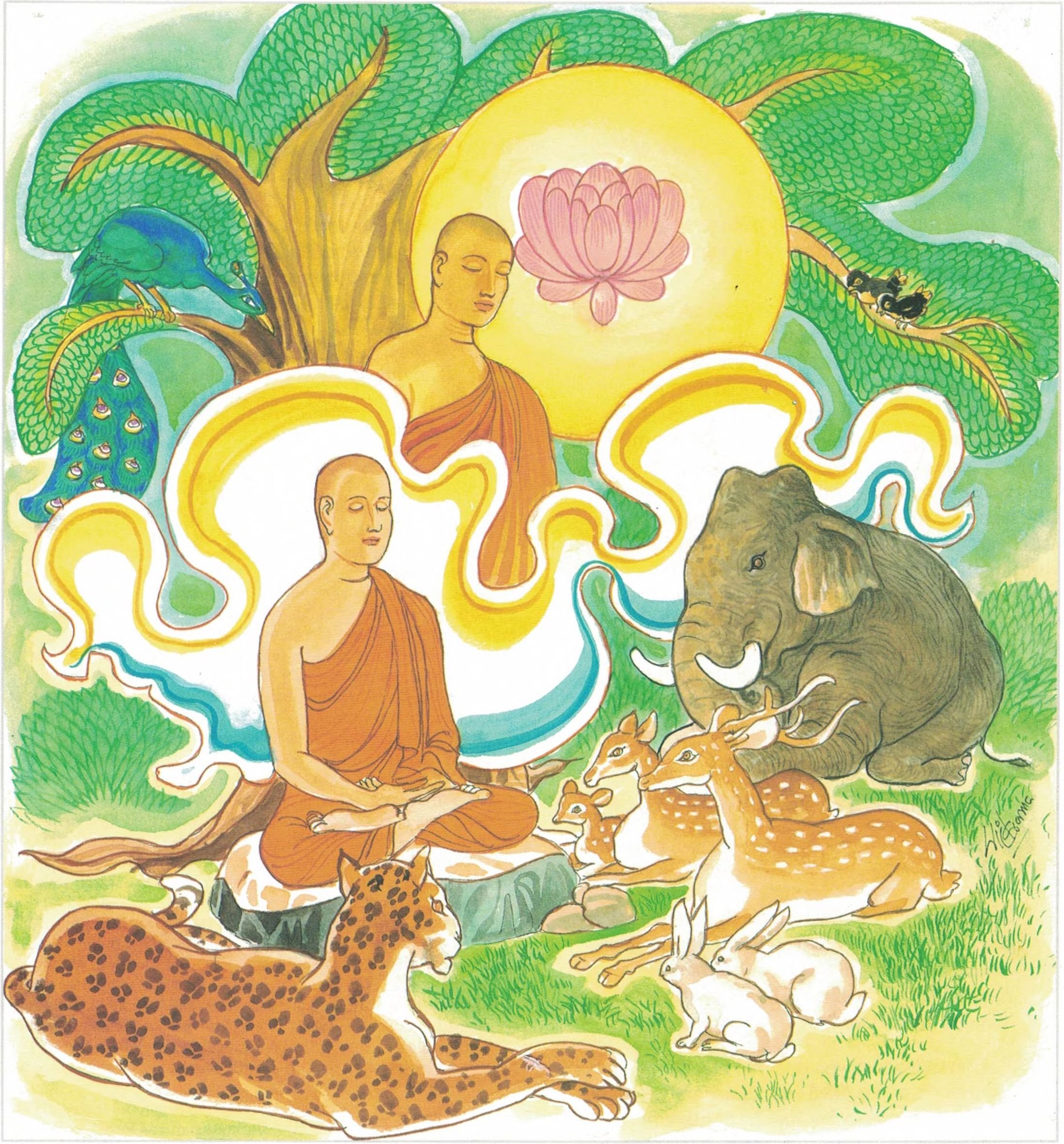Dhammapada (Illustrated)
by Ven. Weagoda Sarada Maha Thero | 1993 | 341,201 words | ISBN-10: 9810049382 | ISBN-13: 9789810049386
This page describes The Story of Venerable Hatthaka which is verse 264-265 of the English translation of the Dhammapada which forms a part of the Sutta Pitaka of the Buddhist canon of literature. Presenting the fundamental basics of the Buddhist way of life, the Dhammapada is a collection of 423 stanzas. This verse 264-265 is part of the Dhammaṭṭha Vagga (Established in Dhamma) and the moral of the story is “Full of lies, greed and desire, he can truly be no monk, parading only his shaven head” (first part only).
Verse 264-265 - The Story of Venerable Hatthaka
Pali text, illustration and English translation of Dhammapada verse 264-265:
na muṇḍakena samaṇo abbato alikaṃ bhaṇaṃ |
icchālobhasamāpanno samaṇo kiṃ bhavissati || 264 ||
yo ca sameti pāpāni aṇuṃ thūlāni sabbaso |
samitattā hi pāpānaṃ samaṇo'ti pavuccati || 265 ||
264. By shaven head no samaṇa if with deceit, no discipline. Engrossed in greed and selfishness how shall he be a samaṇa?
265. All evils altogether he subdues both fine and gross. Having subdued all evil he indeed is called a ‘Samaṇa’.
 Full of lies, greed and desire, he can truly be no monk, parading only his shaven head. |
 Battling all evils, both great and small, through his conquest of evil is he a samaṇa called. |
The Story of Venerable Hatthaka
While residing at the Jetavana Monastery, the Buddha spoke these verses with reference to a monk named Hatthaka.
The story goes that whenever Hatthaka was defeated in an argument he would say, “Pray come to such and such a place at such and such a time and we will resume the discussion.” He would then precede his opponent to the appointed place and say, “See! The heretics are so afraid of me that they dare not meet me; this is a confession of defeat on their part.” This, and much else of the same sort he would say. These were the tactics he invariably employed with one opponent after another whenever he met defeat. The Buddha, hearing that Hatthaka was doing thus and so, sent for him and asked him, “Hatthaka, is the report true that you are doing thus and so?” “It is true,” replied Hatthaka. Then said the Buddha, “Why do you do so? A man who utters such falsehoods has no right to the name of monk merely because he goes about with his head tonsured. But he that conquers sins both small and great, is a monk indeed.”
Explanatory Translation (Verse 264)
muṇḍakena samaṇo na abbato alikaṃ bhaṇaṃ
icchā-lobhasamāpanno kiṃ samaṇo bhavissati
muṇḍakena: by the shaven head; samano na: one does not become a monk; abbato [abbata]: unprincipled; alikaṃ bhaṇaṃ [bhaṇa]: given to lying; icchā-lobhasamāpanno [lobhasamāpanna]: he filled with desire and greed; kiṃ samaṇo bhavissati: how can a monk be
Can an individual who does not practice religion, speaks untruth, and is filled with desire and greed, become an ascetic merely because he is shaven-headed?
Explanatory Translation (Verse 265)
yo ca anuṃ thūlāni pāpāni sabbaso sameti
pāpānaṃ samitattā hi samaṇo iti pavuccati
yo ca: if someone; anuṃ: minute; thūlāni: massive; pāpāni: evil actions; sabbaso [sabbasa]: totally; sameti: quells; pāpānaṃ [pāpāna]: evil actions; samitattā hi: (as) has eradicated fully; samaṇo [samaṇa]: (he) monk; iti pavuccati: is called
If an individual quells all sins, big and small, he is described as an ascetic because he has quelled sins.
Commentary and exegetical material (Verse 264-265)
Jetavana Monastery: A good portion of the stanzas in the Dhammapada originated at Jetavana Monastery. In consequence, this monastery possesses a special significance as the spiritual residence of the Dhammapada.
Jetavana Monastery was built by Anāthapiṇḍika, a stalwart among alltime supporters of Buddhism. Anāthapiṇḍika praised the Buddha for His manner of preaching the doctrine, and took refuge in the Triple Gem as a lay disciple of the Buddha. He further invited the Buddha and the fraternity of monks to receive alms from him the next day at the residence of his brother-in-law, and took leave of the Buddha in reverence.
When the millionaire at Rājagaha heard of the invitation to the Buddha by his brother-in-law, he said, “You yourself are a guest here; so I will provide you with all the expenses in regard to the alms-giving.” “Thank you, O millionaire, I have all the expenses for the purpose,” said Anāthapiṇḍika. Similar offers were made by the chief of the suburbs of Rājagaha, and by King Bimbisāra himself But Anāthapiṇḍika did not accept any such offers. At the end of the alms-giving, Anāthapiṇḍika invited the Buddha to Sāvatthi with the fraternity of monks for residence.
“Well Gone Ones take delight in lonely spots,” said the Buddha. “I know that, Venerable,” asserted Anāthapiṇḍika. The Buddha delivered an admonition to Anāthapiṇḍika, and left the place. After finishing his work at Rājagaha Anāthapiṇḍika left for Sāvatthi. He was a person with many friends and associates, and he used to give good counsel to others. On the way, he told the people, “Friends, lay out parks, build monasteries and offer alms. The Buddha is born in the world. I have invited Him to Sāvatthi; and He will be coming along this road.”
Thus induced by Anāthapiṇḍika the people began to lay out gardens, build monasteries, and make arrangements for alms. No sooner had Anāthapiṇḍika arrived at Sāvatthi than he looked for a suitable spot for the residence of the Buddha, and saw the garden of prince Jeta. So he went to see the prince, and said, “Sir, will you give me your garden to build a monastery?” “No, I will not give my garden even if you were to spread there one billion of gold coins,” said the prince. “I have then bought your garden, prince,” said the millionaire. “No,” said the other.
The dispute as to whether the garden had been bought by Anāthapiṇḍika or not was taken before judicial officers who decided in favour of Anāthapiṇḍika, as the land was bought when the price was fixed.
Anāthapiṇḍika brought a billion of gold coins in cart loads, and covered the ground. But a small spot was left uncovered, and he ordered his men to go and bring more gold coins to cover the remainder. Then prince Jeta thought that the cause for which the millionaire is sacrificing his gold cannot be a light one, and he said, “No, millionaire, you need not cover the balance area with gold. Let me make a donation of the area.”
The millionaire granted his request, as the prince was a well known and highly recognized person, and his patronage meant much. The prince put up an edifice over that area. Anāthapiṇḍika constructed on the Jeta grove monasteries, studies, stores, alms-halls, fire places, lavatories, bathrooms, walks, ambulatories, wells, ponds, heated rooms and pavilions.
The Buddha, after spending sufficient time at Rājagaha, proceeded towards Vesāli, and arrived at Vesāli in due course. Thence the Buddha arrived at Sāvatthi, and came to the Jetavana Monastery. Anāthapiṇḍika offered alms to the Buddha and the fraternity of monks, and on the advice of the Buddha, donated the Jetavana Monastery to the fraternity of monks of the four directions, whether present there or not.
samaṇa: This is a term used to denote religious priests. The members of the Buddhist Sangha are also referred to as samaṇa. In this verse, Buddha describes the person who deserves to be called samaṇa.
Among the four groups of the disciples of the Buddha, bhikkhu (monks), bhikkhunī (nuns), upāsaka (male lay disciples), and upāsikā (female lay disciples)–the Sangha or Order of monks are most closely associated with the Buddha. The duty of the Buddhist monk is to learn the Teachings of the Buddha and to give guidance and advice in accordance with these Teachings. He is also required to perform the religious duties and ceremonies. His duty is not limited to preserving the Buddha’s Word; his duty is also to introduce the Teachings of the Buddha throughout the world. It is not easy to introduce the Buddha’s Teaching in any part of the world without obtaining the proper guidance and assistance from monks.
Buddhist monks are not regarded as priests since they do not act as mediator between deity and man. They can only show the way for those who want to find their own salvation. To approach the Buddha, no mediator is required. There is no need for the special intervention of a priest or any selected person.
From the very beginning of the establishment of the Sangha, two different groups of monks were formed: grantha dhura and vidarshanā dhura. Grantha dhura are the monks who associate with the public. They offer their religious services to society. Educated young men who become monks usually join this group. Vidarshana dhura are the monks who keep away from the busy society and devote their time to meditation. Most elderly men who become monks usually join this group. The monks who associate with the public should not neglect their meditation. They should try to devote at least a few minutes a day for meditation. Those who devote their time only to meditation should give others necessary instruction how to meditate. Both groups of monks are equally important. In certain Buddhist countries, some monks set aside certain periods of time for meditation; then they return to serve the society.
Buddhist monks live a very simple life. Their attitude towards life is filled with tolerance and contentment. In the monasteries where monks live, there is an atmosphere of peace, tranquillity and serenity. There is a look of peace and calm on the smiling faces of many of the monks. Their faces often reflect a dignity, a gentleness, an air of detachment and freedom from the commitments of the householder. Kindness, truthfulness, and devotion towards religion are their duties.
In many Buddhist countries, monks render service not only in the religious field but also in social, educational, cultural and health activities. In fact, monasteries in Buddhist countries are traditionally centres of social service.
If the Buddha had not introduced the Sangha, the Teaching of the Buddha would have disappeared long ago from this world. The tradition of Buddhist councils, which have ensured the perpetuation of the Word of the Buddha, was initiated by monks. Several Councils were held to draw up the canonical texts and the creed of Buddhism in their pure form. Arahant Mahākassapa presided over the first council held in Rājagaha immediately after the passing away of the Buddha.
